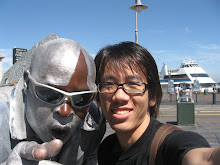kafka on the shore, haruki murakami
interesting and easy read. somehow, it doesn't take much effort to go through the pages and i find myself able to somewhat speed-read, skim-read, or whatever you think of it. sometimes i feel the layout of the words, line spacing, font, paragraphing, word spacing and even length and width of the book affects reading speed.
there are little gems within the book, which is what makes books good reads. however, as a collective whole, the novel seems promising all the way until you reach the end. it's not simply a classic case of bad ending or too much anticipation with the author having built a setup beyond his league to satisfy. i feel like murakami could probably tie things up in a way that gives the major incidents in the novel definite meaning. he simply doesn't as part of his intention. and it's almost expected, given the surreal like events in the novel.
it's just turns out to be a mambo of metaphors and under individual interpretation, they can amount to anything, and classicly hence to nothing. I get some of it, but i don't get a lot more. and trying to connect them isn't all i want. i want to connect them the way the author intends; at least until i come up with another favorite interpretation. who wants to watch "waiting for godot" and end up not knowing a damn thing about its meaning, to ponder over it and come up with 5 different interpretations, each having to make different assumptions and disqualify certain events, later to find out the author meant nothing at all. like a trick. but "waiting for godot" has a author unintended favorite to many including myself, and that seems to be what makes it successful - the interpretation of godot being god. perhaps this vagueness coupled with luck yields success once in a while. but that's not what i would have wanted out of "kafka on the shore". it's a pity if i have to conclude that the build up leads to nothing but the author's playing around with, not too deeply, with concepts like self and the oedipus complex. ultimately then, this novel is more literary than philosophical. more english (or japanese) than literature. more surface form than underlying meaning. that would be sad.
perhaps the best way to appreciate it without judging too much is to not ask for too much and view each incident as independent on its own. like a dream, where the second scene feels connected to the first, but doesn't have to be, and is probably not. some things remain, for example, you, being in the dream. and maybe 2 people next to you. but one moment they could be your parents, and the next 2 schoolmates who don't even know each other, but with the physical form of a stranger you remember on the bus last night.
the intriguing aspects are all not finished on in the novel - the losing consciousness incidents, nakata and all his special situations, also hoshino and his; the connection between reality and dream is too blurred, and that's why the novel makes sense as a dream and hardly anything beyond that. still, indefinite unconnected and perhaps inherently meaningless dreams can be a pleasurable experience and precious memory and this novel is worth a read for that.
Saturday, January 2, 2010
Subscribe to:
Post Comments (Atom)

No comments:
Post a Comment